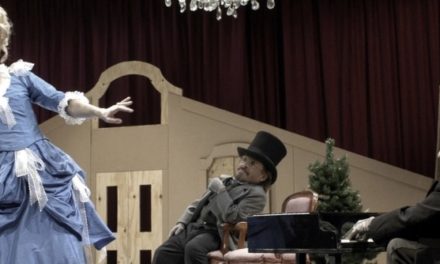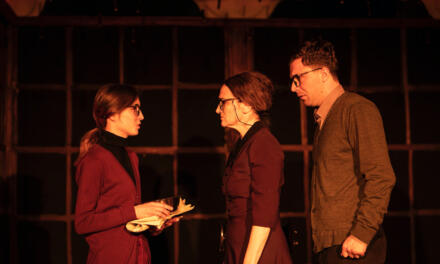Amanda Palmer has not come to entertain. Instead, she has written and designed what feels like an entirely new form of musical theatre, a 4-hour blisteringly personal monologue that ranges in style from cabaret to stand-up. There is nothing else like it on stage. Imagine Lotte Lenya, Kurt Weill, and Bertold Brecht, all in one person: the voice, the melody, and the wit.
In her return to London’s Union Chapel for There Will be no Intermission, Amanda Palmer tells us outright that things will get dark. She invites the audience to yell ‘Amanda I’m sad’ at any point during the monologue, and promises to play the upbeat opening cords to the Dresden Dolls song ‘Coin-Operated Boy’. First as tragedy, then as farce.
Why does Palmer embrace the narrative format of confession? She jokes that her parents, like good New Englanders, did not believe in therapy, just in good old-fashioned suffering. Keenly aware of the commercial nature of today’s confession-obsessed culture, she tells us that the last thing she wants to do is inflict upon us a four hour TED talk.
Instead, what we get is a mix of Phoebe-Waller Bridge’s intensely provocative ‘Fleabag’ monologue, with a sprinkling of Bruce Springsteen’s hit-Broadway tour, and a dose of Ian Mckellen’s improvised tour through the works of Shakespeare. What these recent plays have in common is that they are all grasping for a new form of connection with their audiences. The goal is to go beyond the stagey theatrics of performance as mere entertainment.
In so doing Palmer discusses themes from motherhood to abortion, and performs as chanteuse, jester, and troubadour. Just don’t call it ‘gay mime’. And while the subjects of discussion are invariably grim, she teases out sufficient contradiction and counter-intuitive insights to make them come alive.
It is the tension between the ‘can’, and ‘must’ that defines Palmer’s feminism. Whether it is the choice to become a mother (she has a child) or to have an abortion (she has several), the question is never just ‘whether it must be done’, but whether it ought to be done.
Palmer fully embraces the compulsive nature of Kant’s less famous moral imperative: “Du Kannst, denn du Sollst!” (you can because you must). In her characteristically flippant style, she attributes this aphorism to a former Yoga teacher. But she understands the darker nature of Kant’s statement. It is not just ‘you can, so you must’, but rather ‘you can, because you cannot not do it!”
This compulsive tendency lends itself perfectly to satirical musical theatre, in which the supposedly glib attitude of feminists towards abortion (“why not”?) is thoroughly exposed. In so doing, Palmer also indicts contemporary liberal attitudes towards abortion and the insistence on a narrative of female victimhood. Palmer’s work, with its keen ear for irony, is antithetical to much of what today goes by the name of feminism. And she is not afraid of a fight.
The allusion is to a song about abortion, blithely titled ‘Oasis’ that stoked outrage online for being too upbeat. The underlying point, which was to act-out and satirize the prejudice against ‘women who are casual about abortion’, was lost in the online battles that ensued. It is but one of many ways in which Amanda Palmer’s work has been misunderstood. Would her song have been more acceptable if it were a tragedy, instead of satire?
To illustrate her point, Palmer sardonically plays the same song for us in a downbeat minor key. It is slow, wistful and melancholy, a parody of romantic Art, sufficiently morose to satisfy the expectations of her critics. Point taken. Such a version is, of course, nothing but sentimental affect. Affectation spells the end of Art and Palmer knows it.
And yet there is a raw quality to speaking about abortion in this manner. Quickly moving from comedy to tragedy, Palmer tells us in detail about her miscarriage, painting a scene in which she stands looking out over the New England commune where she had hoped to give birth, ‘holding death in my hands’.
This is not just feminist. It is also Goth. If all life skirts around the edges of death, then the truest way to live is in the shadows, in those parts that are considered outside the light. There is a moral invective here, which is that of ‘radical compassion’.
And this compassion, for murderers and mothers alike, comes only when one recognizes the cracks that divide darkness and light. For Amanda Palmer, these cracks are clearly those between the keys of the piano. And it is from these that she wrests the truth of her own situation and finds common purpose in them.
Bertold Brecht, who actively courted misinterpretation, would no doubt have chuckled at Palmer’s suggestion that the song to Disney’s ‘The Little Mermaid’ contains four different voices, including a ‘neglected vagina’. This is no idle provocation. Instead, she adopts the Brechtian attitude that Art is not a mirror held up to society, but a hammer with which to shape it. No sacred idols here.
Her supporters often use the word ‘catharsis’ and ‘cathartic’ to describe this world tour of ‘piano, pain, and laughter’. But that does not quite describe the nature of Palmer’s endeavor. Her most moving songs are always those that manage in some way to create a certain distancing between experience and its traumatic kernel.
A good example is the song ‘Voicemail for Jill’. The pain on display here is not that of Catharsis, but the exact opposite. It is a song about how people suffer in silence, denied any cathartic meaning. Compassion is about making the decision that no life is worth less or more than any other.
But this doesn’t render all suffering equal. The moral imperative is not to act in expectation of reciprocity, but to have the emotional imagination to suspect that there is pain that goes unseen. Palmer reminds us that the true nature of tragedy is not the utilitarian potential for catharsis, but the universal dimension of unacknowledged pain.
There is, of course, a danger to ‘explaining’ one’s music. Does it matter whether an aria was written on the composer’s deathbed or a certain motive created by accident during rehearsals? If the goal is to ‘bring us closer’ to the music then this only belies the fact that it is considered too remote to be ‘properly’ understood. The unintended outcome of contextual explanations, however good-willed, is that they often do the imagining for us. ‘Think of rainclouds during this part’, etc.
So what is the alternative? Is there a way to merge ‘say-all’ narrative performance with the satirical wrecking ball of musical theatre? It is a high wire act to watch. The feat lies not in the distance crossed but in the depth faced. The music is what makes this work. Alternately moving, funny, and always surprising, her songwriting bursts with originality, and manages to be both gleefully irreverent and touchingly earnest.
It is a rare thing for a performance to feel like an Event. Especially when said performance is repeated all across the globe, spanning hundreds of hours and countless venues, crowds, nameless faces. And yet Amanda Palmer succeeds entirely. As a critic one often worries about the future of the performing arts. Will ‘live-streaming’ and ‘crowd-funded’ Art devalue the performance and anesthetize the Artist? Maybe. But not for Amanda (Fucking) Palmer. As she likes to say, ‘We are the media’.
This post was written by the author in their personal capacity.The opinions expressed in this article are the author’s own and do not reflect the view of The Theatre Times, their staff or collaborators.
This post was written by Julian De Medeiros.
The views expressed here belong to the author and do not necessarily reflect our views and opinions.


















